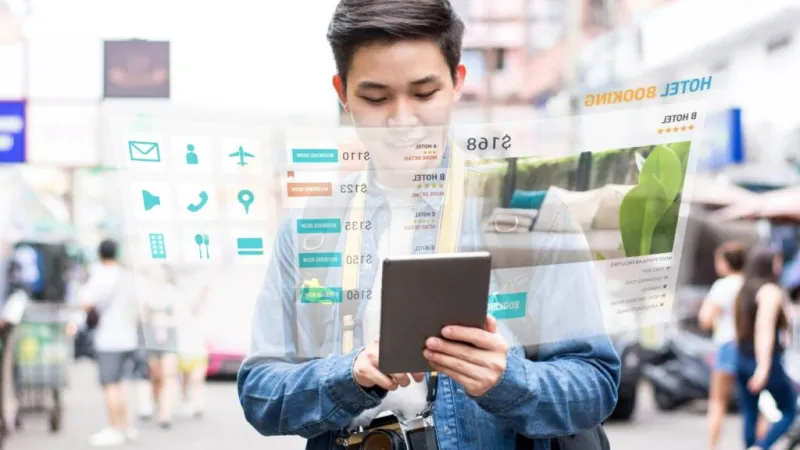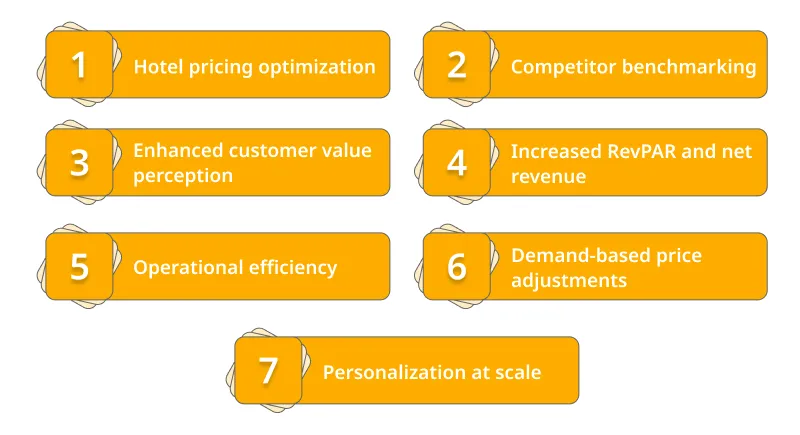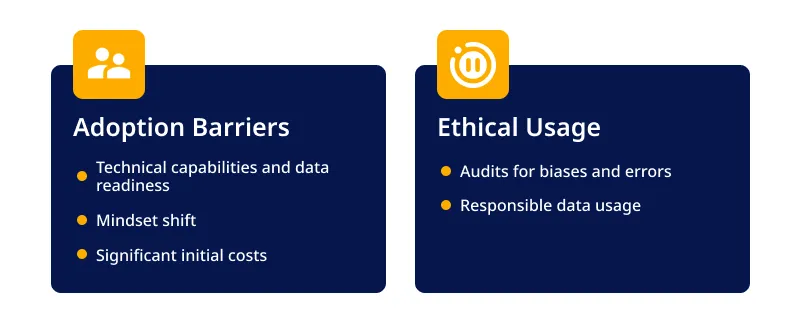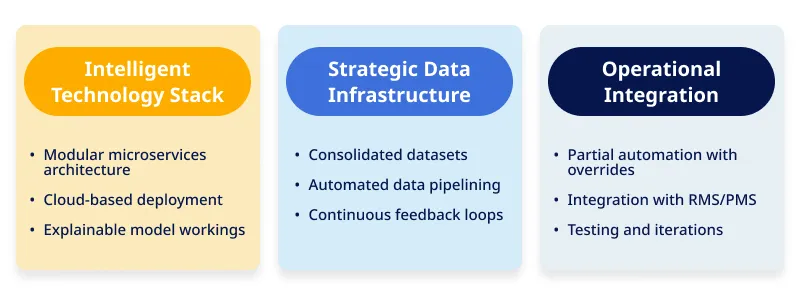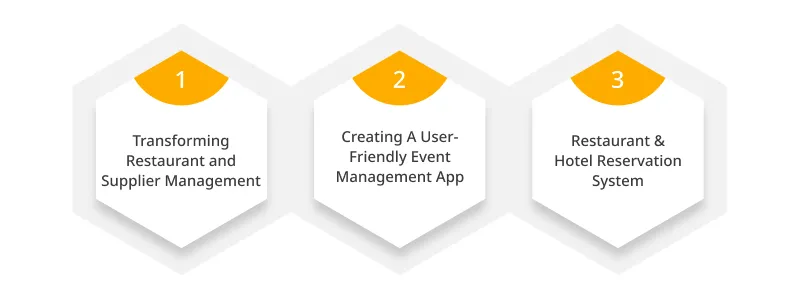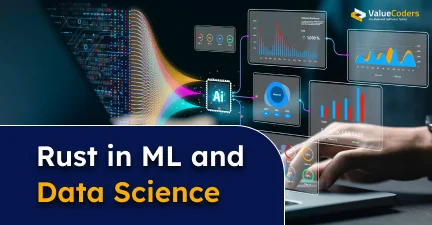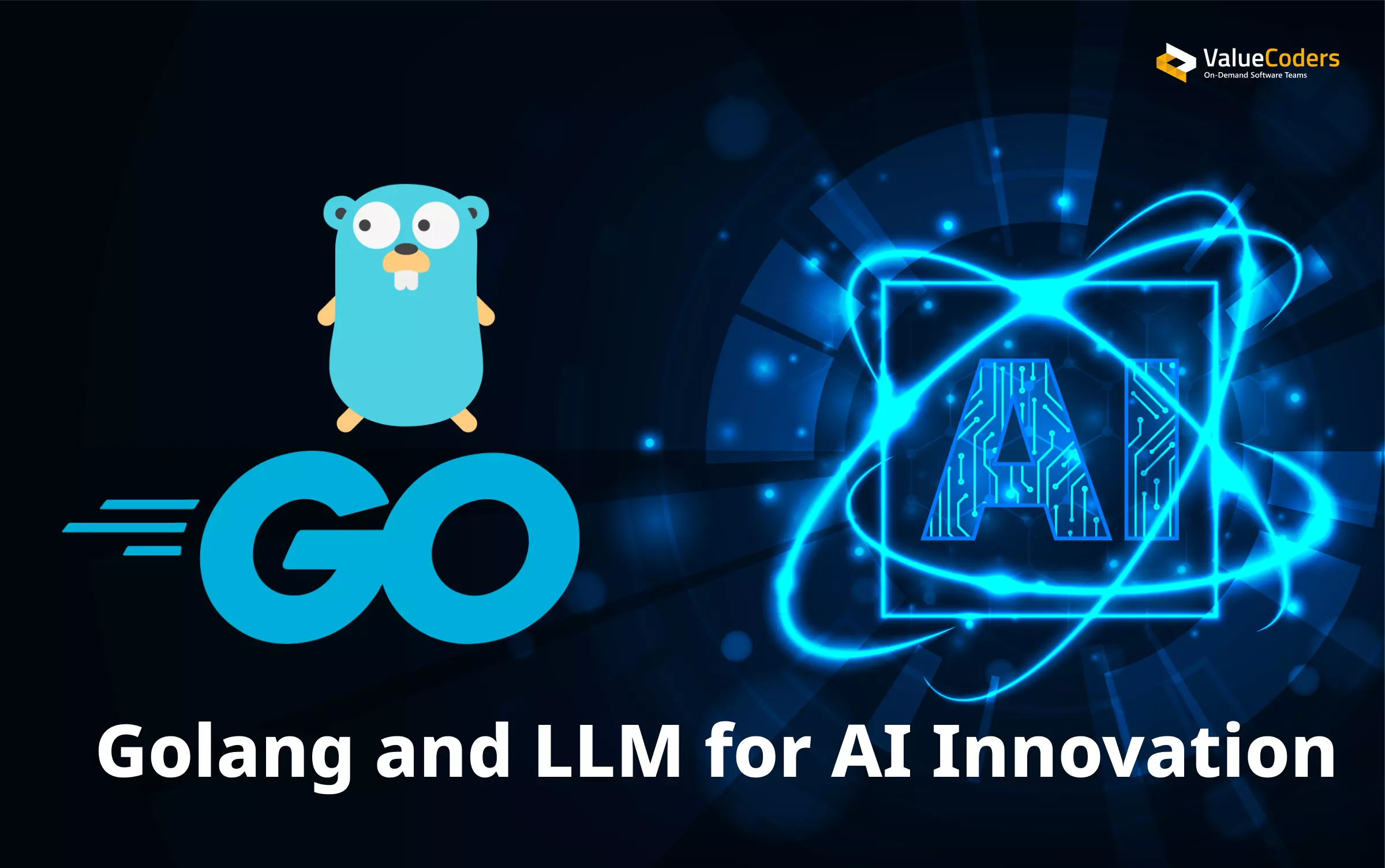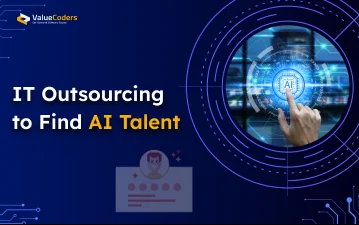In an increasingly competitive hospitality landscape, leveraging AI in hospitality industry is critical to strategic pricing and revenue growth. As per PwC, nearly 72% of hospitality leaders plan to implement AI-powered revenue management solutions.
With the ability to analyze mountains of data, AI enables hotels and travel businesses to set optimal, market-aligned prices dynamically. This helps them maximize occupancy and revenue while delivering value to customers.
AI pricing tools in the hospitality industry automatically adjust rates accurately based on market demand, events, and competitor prices. As AI transforms hospitality, players embracing dynamic pricing require intelligent, integrated solutions that can drive perceivable ROI.
This blog post explores best practices in leveraging AI for pricing in hospitality, its implementation considerations, use cases demonstrating the competitive advantage unlocked by AI, and a glimpse into the future of this revolutionary technology.
Let’s dive in!
Understanding Dynamic Pricing in Hospitality
Dynamic pricing, or real-time pricing, refers to a pricing strategy where hotel businesses and online travel aggregators automatically adjust room rates in response to market demand shifts. This helps maximize both occupancy and revenue per available room.
AI in hospitality industry has made dynamic pricing increasingly agile and accurate, enabling companies to have AI-driven pricing strategies.
AI solutions for healthcare, hospitality, and other businesses integrate their property management software or channel manager with AI solutions of hospitality industry to get optimized price recommendations based on machine learning algorithms. These consider factors like competitor rates, seasons, events, demand forecasting, and length of stay.
Empower your strategy with AI algorithms that forecast demand, track competition, and recommend optimized prices.
AI in hospitality industry pricing tools can sense demand changes in real time and switch to dynamic rates as needed. Rather than time-consuming manual analysis, this automatic, data-led approach makes dynamic pricing feasible for hotels and travel companies.
As an Artificial Intelligence services company, our experts can guide the optimal integration of AI for maximized profit.
The Role of AI in Dynamic Pricing
AI pricing intelligence in hospitality is transforming traditional revenue management approaches with its ability to rapidly analyze data and optimize AI-driven hotel pricing strategies.
AI-powered platforms leverage complex algorithms and machine learning models to deliver actionable pricing insights not perceivable through manual analysis.
Key capabilities of AI in enabling dynamic pricing include:
- Forecasting demand
- Benchmarking against competitors
- Personalize price optimization
- Continual self-learning
As AI evolves continuously, its ability to digest vast amounts of information and provide data-backed pricing insights will be invaluable for hotels seeking to maximize revenues through dynamic pricing.
Also Read: Navigating The World Of AI Development: Opportunities & Challenges
Benefits of AI-driven Dynamic Pricing
Implementing AI in hospitality industry solutions for dynamic pricing unlocks significant benefits that directly impact profitability for hotels and online travel agencies.
With machine learning models capable of processing substantial information sets from diverse sources, AI in hospitality delivers value in areas like:
- Hotel pricing optimization: AI algorithms analyze demand forecasts, events calendars, market trends, and other factors to recommend optimal prices to maximize revenue per available room. Their predictive pricing models become highly accurate over time. This prevents under or overpricing rooms.
- Competitor benchmarking: By scraping up-to-date competitor rates from OTAs and metasearch sites, AI in hospitality industry tools empower businesses to align pricing to the market. This remains a very manual-intensive process otherwise.
- Enhanced customer value perception: Insights from AI in hospitality demand forecasts and competitor data allow businesses to offer competitive rates in line with customer expectations. This leads to higher perceived value.
- Increased RevPAR and net revenue: One survey saw a 9.1% revenue lift for hotels implementing AI dynamic pricing. The boost without increasing occupancy is enabled purely by optimal pricing.
- Operational efficiency: AI automation of complex pricing analysis and rate updates frees staff to focus on other revenue-driving initiatives.
- Demand-based price adjustments: Machine learning algorithms automatically tweak room rates based on demand spikes around events, holidays, etc., to maximize revenues.
- Personalization at scale: With the ability to process infinite data points, AI can deliver personalized price recommendations for each hotel based on its unique location, markets, demand cycles, etc.
As a generative AI services provider, our AI pricing solutions have enabled over 30% RevPAR growth for multiple hospitality clients. The mathematically-optimized, data-backed algorithms make AI a game-changing technology for this sector.
Our dynamic pricing AI responds to market changes with science-led price updates for RevPAR growth.
Challenges and Considerations
While dynamic pricing powered by AI delivers immense value, hospitality players need to address some critical challenges and considerations during and post-implementation:
1. Adoption Barriers
- Technical capabilities and data readiness: Integrating AI algorithms and machine learning models into existing AI in hotel revenue management systems requires strong data engineering skills. Clean, well-organized datasets related to demand, bookings, cancellations, competitor pricing, and more are needed to train and validate the models. Many hotels lack the expertise or infrastructure for robust AI adoption.
- Mindset shift: Transitioning to AI-based price optimization from traditional intuitive pricing needs a culture change as the role of revenue managers evolves. Rather than fully owning pricing decisions, their focus becomes oversight of model outputs and exception handling. Tactical change management is vital to drive adoption.
- Significant initial costs: While AI delivers strong ROI long-term, upfront costs for on-premise infrastructure, data organization, and vendor fees can seem prohibitive initially. However, the increasing availability of cloud-based AI pricing solutions lowers this barrier.
2. Ethical Usage
As AI takes over automated pricing decisions, accountable and transparent practices are non-negotiable:
- Audits for biases and errors: Left unchecked, there is a small risk of AI algorithms discriminating against specific customer demographics in pricing. Continued model evaluation is vital to prevent unfair biases.
- Responsible data usage: Hotels need clear guest communication on data collection policies and usage in AI systems to build trust. Data transparency principles also apply to third-party vendor contracts.
The revenue growth potential of Generative AI integration services in dynamic pricing makes overcoming these adoption barriers worthwhile for hospitality firms. Seeking responsible AI solutions and partners can help maximize value while addressing ethical considerations.
Best Practices for AI-Driven Pricing
As hotels look to stay competitive through AI-powered dynamic pricing, following certain best practices is vital to long-term success:
1. Intelligent Technology Stack
- Modular microservices architecture: Build AI-driven pricing solutions using separate modular components like demand forecasters, rate optimizers, competitive rate trackers, etc, rather than a monolith system. This allows improving or swapping out components without full architecture overhauls.
- Cloud-based deployment: Running AI models on secure, reliable cloud platforms enables quick ramp-up, scalability to process large data workloads, and cost savings compared to on-premise infrastructure. Critical data transfer between the cloud AI system and the hotel’s on-premise IT infrastructure remains private through encryption.
- Explainable model workings: Using explainable AI techniques to provide visibility into why models make certain pricing decisions builds confidence in end-users to adopt recommendations. When you hire AI engineers, they can validate model features and internal weighting to align with business objectives.
2. Strategic Data Infrastructure
- Consolidated datasets: Organized, high-quality historical and live data beyond core PMS data like bookings, cancellations, stay patterns, guest demographics, comp sets, and competitor pricing data is imperative to train and operate pricing models.
- Automated data pipelining: Smart connectivity via APIs automatically transfers relevant datasets from hotel systems into cloud data lakes, avoiding manual efforts. This enables accessible data for model retraining.
- Continuous feedback loops: Dynamic rates management solutions algorithms update pricing models by continually ingesting the latest hotel demand signals, booking conversions, and competitor price changes. This tight refinement loop drives recommendation accuracy.
3. Operational Integration
- Partial automation with overrides: Blending AI-based dynamic pricing automation with human oversight capabilities allows manual overrides during exceptions like emergencies while benefiting from automation.
- Integration with RMS/PMS: Tight integration with existing revenue management systems and PMS via APIs allows seamless adoption of AI-powered dynamic pricing with minimal disruption.
- Testing and iterations: Run A/B testing of AI pricing suggestions across a hotel sample before hotel-wide rollout. Use findings to refine configurations to that property’s unique needs.
Adopting the above technology, data, and process measures enables hospitality firms to benefit from AI while avoiding implementation pitfalls.
Our real-time pricing AI scrapes competitor data and adjusts your room rates dynamically based on the market.
Case Studies of ValueCoders
ValueCoders has successfully leveraged AI in the hospitality industry through various projects, providing innovative solutions that have transformed businesses and enhanced their customer experiences. Let’s look into some of our notable AI use cases:
1. Transforming Restaurant and Supplier Management
- A leading industry player approached ValueCoders with the challenge of modernizing their restaurant and supplier management platform.
- Our expert team meticulously analyzed their requirements and developed a tailored solution using AI technology.
- The resulting platform streamlined inventory management, menu optimization, and supplier interactions, increasing efficiency and cost savings.
- By implementing AI-driven algorithms, the platform dynamically adjusted inventory levels and menu offerings based on demand patterns, maximizing profitability.
2. Creating A User-Friendly Event Management App
- In a project based in Dubai, ValueCoders developed an intuitive app and website catering to both customers and vendors in the events industry.
- The primary goal was to enhance user convenience and choice while ensuring competitive pricing across various service categories such as catering, entertainment, and gifts.
- Our team incorporated AI-powered recommendation engines to personalize user service suggestions, increasing engagement and satisfaction.
- The platform’s seamless integration of AI algorithms enabled efficient vendor matching with customer preferences, positively impacting user experience and vendor visibility.
3. Restaurant & Hotel Reservation System
- Another client sought ValueCoders’ expertise in developing a comprehensive mobile application serving as a restaurant and hotel reservation system.
- Our team employed AI-driven predictive analytics to forecast demand and optimize reservation availability, reducing wait times and improving customer satisfaction.
- The platform’s intelligent features allow for dynamic pricing adjustments based on occupancy rates and seasonal demand fluctuations.
- By harnessing the power of AI algorithms, the reservation system enhanced operational efficiency for the client’s business while providing a seamless booking experience for customers.
These case studies exemplify ValueCoders’ commitment to delivering cutting-edge solutions powered by AI technology in the hospitality sector.
Through our expert AI consulting services and innovative approach, we continue to drive tangible value for our clients, helping them stay ahead in today’s dynamic market landscape.
Also Read: Top 5 Adaptive AI Development Companies Leading The Future
Future Trends and Predictions
Already transforming legacy practices, AI in hospitality industry pricing is poised for massive headway aligned to technological and economic tailwinds:
1. Broader adoption spurred by ROI
As early adopters reap over 20% revenue lift, the compelling ROI will motivate mainstream hospitality players to adopt machine learning for hotel pricing. Vendor solutions being competitive against on-premise setups also improves accessibility.
2. Enhanced automation capabilities
With continual improvements, AI systems will not just advise but directly set and update optimal hotel rates based on market context. This automated pricing in hospitality will boost productivity.
3. Richer data utilization
Aggregating new external datasets like web traffic, search trends, and tourist flow, along with IoT sensor data, will allow AI in hospitality to keep enhancing forecasting. Granular room-type level pricing will emerge.
While concerns about transparent AI practices persist, specialized contextual guidance for national events and micro-market nuances will evolve.
As algorithms get more innovative, leveraging rich data and automation deeper, AI in hospitality industry pricing will grow ubiquitous.
With the sizable revenue impact dynamic pricing delivers, hotels now have accessible avenues via ethical vendors like us to go for an AI transformation even with constrained resources. The incentives align well with the present adoption.
Our AI engineers can integrate custom dynamic pricing solutions into your existing systems seamlessly.
Conclusion
As this post explored, AI in hospitality industry is a transformative force enabling organizations to boost competitiveness through real-time pricing aligned to markets.
With the ability to continually optimize price points based on myriad demand signals and competitive trends, data-backed AI in hospitality unlocks up to 20% revenue gains. And we have only scratched the surface of possibilities.
As algorithms get more competent at forecasting and integrations deeper, businesses need to embrace AI to stay ahead of the curve. Our specialized AI in hospitality solutions delivers marked gains for hospitality firms seeking responsible yet results-driven means to transform pricing digitally.
Reach out to our AI development company experts for a free consultation on tailoring AI to your unique needs. Uncover growth opportunities and future-proof your business in an AI-led world with the right technology partner.


